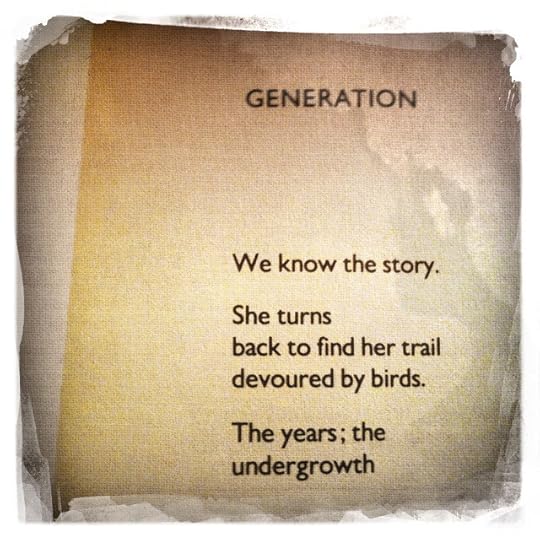The Regeneration of Rae Armantrout out of What Rae Armantrout Would Eventually Become
 Rae Armantrout, "Generation," from Extremities (1978)
Rae Armantrout, "Generation," from Extremities (1978)Gretel is not among us, never having made it out of the woods.
I am entranced by the words of women. Their voices may be so much different from each other, as is their eyesight (vision), yet those are the voices I yearn for, lean into, require. Women seem to have an advantage over men with language, for which reason I (so pathologically verbal that I function well only within the realm of language) spent much of last night talking to James Belflower about the fact that all my favorite living poets are women, that I don't even know which male poets to read. Even though I do read them.
Rae Armantrout has been putting out books of poetry since the year I graduated from high school, and I read that first book of hers ( Extremities ) a couple of days ago, hearing in it the voice she has today, and finding within its too few pages all these recollections of poems I'd never read. As if her voice 34 years ago was an echo of her voice today.
One small poem, her forte, that stopped me was "Generation," a brief retelling of "Hansel and Gretel," by my reading, and focused on Gretel. The brevity of this is stunning to me. Its power in so few words. And how those words are used: the first line presented as a whole sentence; the severe enjambment after "turns" and "the"; ending with the unexpected but revelatory "undergrowth."
Only a day before this, I had created my own allusion to the same fairytale in a strange long entry in my poetics and written as a response to Anne Gorrick's review of her life with Sylvia Plath:
Everyone is lost in the woods. We ate all the breadbecause we were lost in the woods. No crumbs dropped for the return. We don'twant to go home anyway. We want to make a new home, to find a new place to be,a new way to be. So we are searching.
In comparison, I am verbose and maybe even lacking in imagination. Still, I like these words well enough.
What amazes me most about Armantrout, though, is how little her style has changed. It is as if she were born a fully formed poet and merely continued in the direction required of her. The words are short, careful, arranged like china and silverware at a banquet, and somewhat elusive (when not allusive). She doesn't say as much as she means, and she does this quietly, efficiently, as the craftsperson and the artist that she is.
Originally, this book cost US$2.50, but I paid many times that much for the book, a dear price for a small book, yet a reasonable price for us. Her words make demands of me and they nourish me.
As a woman making demands of those in her care, yet always focused on that care.
_____
Armantrout, Rae. Extremities. The Figures: Kensington, Calif., 1978.
ecr. l'inf.
Published on January 21, 2012 13:50
No comments have been added yet.



